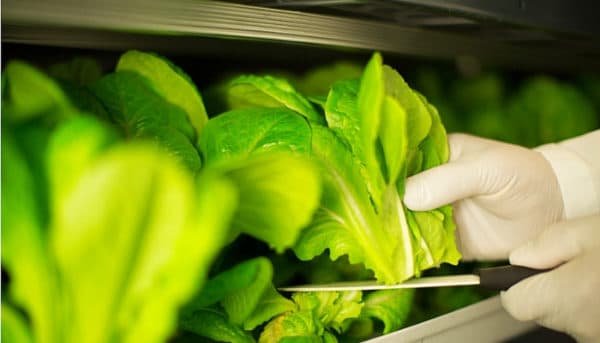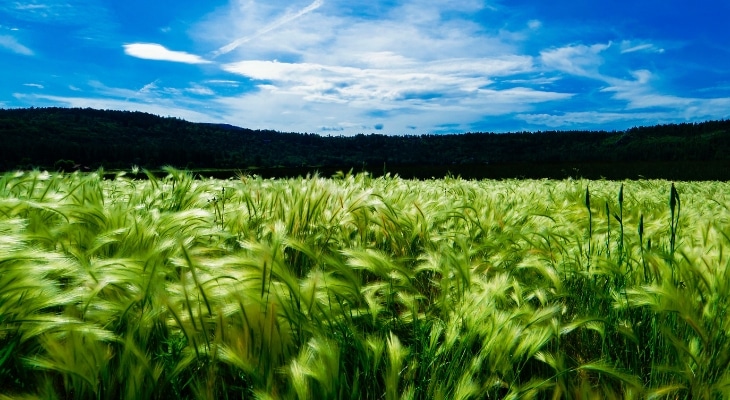Tall Order: Emirates Airlines Commissions $40M ‘Better Than Organic’ Vertical Farm
Emirates Airlines has commissioned a US$40 million vertical farm to provide its passengers with fresh, pesticide-free salads and greens. It will be, in the words of Dubai’s ruler, Sheikh Mohammed, “better than organic”. Michael Wale reports.
‘Better than organic’ is the bold slogan of the US$40m vertical farm – the world’s biggest – backed by the Dubai authorities to supply fresh salads and greens to Emirates Airlines.
Emirates, which flies long haul flights across the world serve an estimated 200,000 meals a day, and the massive vertical farm is to be built adjacent to Dubai International Airport for swiftness of the three times a day delivery.
The airline says it wants to serve meals without herbicides or pesticides. To add to this anything, connected with GM has been banned across the UAE for several years.
Dr Deane Falcone, chief scientific officer at Crop One Holdings, the young American company chosen to build and operate the vertical farm, says of Sheikh Mohammed’s slogan ‘Better than organic”: “Organic is formed from natural fertilisers. The material side from manure. We could use natural fertilisers. Bacteria is fine in the soil, but in the water system it causes a lack of balance. We did try on, a small scale, some organic nutrients – but you must keep the water moving, aerated, and ensure you don’t clog the pipes.”
The only macronutrients they currently use in are liquid nutritional plant feed such as potash. Falcone says: “ The movement of the water is the most important. It’s a closed system. The plants are grown on shelves ten feet wide with a pump moving the water and pushing it in a circular distribution. Each shelf has a tray that fills with water, there is no evaporation and 100% of the water goes into the plant. The only evaporation is through the plant’s leaves”.

At present Crop One produce vegetables and salad stuff under the branded name of FreshBox Farms, from its base at Millis, Massachusetts. FreshBox greens and salad products are sold as ‘local’ at a limit of 100 miles from their growth. As they are not grown in soil they cannot, currently, be labelled organic under USDA regulations on organic agriculture , but they are marketed as using no GMO, herbicides or pesticides, and with the claim that “ when it comes to your well being, our leafy greens pack a healthy punch on delivering a wide range of vitamins, minerals and natural benefits.”
The biggest argument for vertical farming is its remarkable water-efficiency – It’s claimed that the planned Dubai farm will save an astonishing 99% of the water used in soil-based farming, to grow the same volume of crops. There is also a dramatic reduction in land use. Dubai’s vertical farm will cover 130,000 square feet, and it is claimed will have the production of plants that would take 900 acres out of doors. At full production the facility will harvest three tons of high quality, herbicide- free and pesticide-free leafy greens daily.
The proximity of the farm to the point of consumption also substantially reduces carbon emissions associated with transportation. And it ensures the quick delivery of the fresh products, reaching customers within hours of harvest, maintaining high nutritional value.
Deane Falcone points out that a the major advantages of vertical farming is that crops can be grown within 30 days at the most – he cites as example spinach, which is typically grown and packed within 28 days.
Two of the big factors determining yield are growing temperature, and the amount of light crops receive. Falcone says: “ The bottom line is that first we set the temperatures for growing. For lettuces it’s around 690 F in the day and 650 F at night. We can define daytime for the plants for any time we like. Plants have an internal clock and that is set by day and night. But we programme that time instead. We trick the plants, with autumn never arriving. We want them growing, so we control the ‘daylight’ that comes from LED lights. The lettuces, for example, get 16 hours daylight and eight hours dark. So we can completely control the environment”.
Back to those LEDs that Deane Falcone mentioned. The high cost of them, he admits, had presented vertical farming with one of its biggest challenges. But a dramatic fall in the cost of LED lighting in recent years has enabled vertical farming to grow quickly.

Crop One is looking at alternatives, especially the use of solar to create electricity in the plans for the building in Dubai. But despite the continual sunshine, which draws the tourists, solar panels are rare in the Emirates due to the occasional sandstorms that would smother the panels, and cause huge expense to keep clean. There is also regular dust, which is also not helpful. But the Government are working on plans to overcome these drawbacks.
The costs of the lighting and water have forced up the price of the final product, sometimes higher than organic, and has forced several smaller organisations out of business over the years. As a result Crop One have spent a lot of time on research and development in this area. During the planning for the massive Dubai farm, the company has running tests on smaller scale prototyped and demos. Everything has to be perfect when the real plant is commissioned. “We have to plan to produce for high end cuisine. High quality, squeaky clean”.
A question that is frequently asked about food grown indoors is the effect on its taste. I raise it with Falcone. He tells me: “The taste is fine. We do a lot of tours of our site. The main thing we tell the public to do when they come on these tours is to taste the products. Spinach is one of the more challenging plants we grow. I have eaten our spinach raw, and it is fabulous”.
‘Better Than Organic’ is bold claim. But if the Dubai project becomes the success Emirates Airlines expect it to, it might be something that the organic industry might have to face up to.
About the author: Jim Mason
Jim Manson is editor-in-chief of Diversified Communications UK‘s natural and organic publishing portfolio. He’s written widely on environment and development issues for specialist magazines and national media, including the Financial Times, The Guardian, The Times, and World Bank Urban Age.
About Natural Products Global
Natural Products Global is the one-stop global resource for natural and organic industry professionals. Built around an editorially independent daily news service it delivers a compelling mix of news, business insights and analysis. Building a natural and organic future by connecting people and growing businesses – subscribe for more articles like this
-
Get your FREE ticket
- REGISTER FOR FREE

